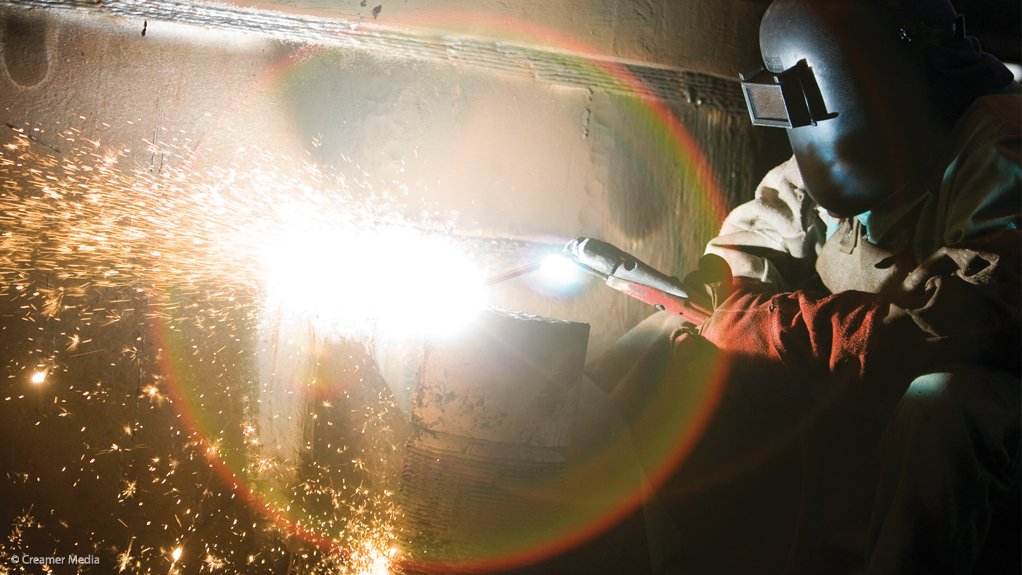The seasonally adjusted Barclays Purchasing Managers’ Index (PMI) remained unchanged at 51.4 index points in July, following a strong gain, albeit from very depressed levels in May, and a further rise in June.
Barclays Africa economist Miyelani Maluleke explained that, although the 51.4 points was not a great reading, it was a welcome positive signal, given that the manufacturing sector had to navigate a challenging environment, including electricity supply constraints.
Speaking to Engineering News Online in a telephone interview, he said an interesting picture emerged when looking at the underlying details of the PMI, where big variations were found.
The major subcategories of the PMI showed a mixed performance during July. On a positive note, the seasonally adjusted business activity and inventories indices posted further gains. At 53.2 index points, the business activity index reached its best level since January.
Maluleke pointed out that the manufacturing sector, which had been under strain for many years now, had negatively contributed to gross domestic product growth in the first quarter of this year.
“We also saw Statistics South Africa’s data in June showing further output contraction on a month-to-month basis. The higher business activity in July is, no doubt, an encouraging signal about third-quarter prospects for output,” he added.
Another feature was the disconnect in the fact that the new sales orders index declined - falling 1.9 index points and below the 50-point threshold - while purchasing managers remained optimistic about the future, owing to the sustained weakening trend of the rand exchange rate and improved news flow on the Greek debt crisis. The index measuring expected business conditions in six months gained 1.2 points to 63.2.
Maluleke said the performance of the new sales orders index was concerning, as it was a general proxy of demand in the local economy.
“The inventory levels rose quite sharply, which could be reflecting that demand is very weak, or that manufacturers are expecting conditions to pick up in a big way over the coming months. The latter seems to match the expectations of business conditions index, which also improved strongly in July,” he highlighted
Meanwhile, the employment index remained stuck below the 50-point level – decreasing by nearly two points to 46.9 in July.
Of the key PMI subcomponents, the inventories index recorded the biggest gain in July, rising by 3.4 points to 60.2.
There was also some good news on the input cost front, with the PMI price index having declined by 2.1 points to 75 in July. The easing in cost pressures could have already reflected the impact of lower commodity prices, including the renewed decline in the Brent crude oil price.
However, the PMI leading indicator was not nearly as upbeat. The indicator looked at the ratio between new sales orders and inventories. A number above one suggested that demand was outstripping the level of inventories and below one vice versa. The leading indicator declined further to 0.8 in July, which did not bode well for manufacturing production going forward.
BNP Paribas Cadiz Securities economist Jeffrey Schultz noted that, while the PMI was still above its neutral level of 50, it forecast subdued domestic activity and demand conditions for local manufacturing.
“The fact that the PMI leading index continues to struggle to climb above its expansionary level of one indicates that these lacklustre conditions are likely to continue over the medium term as electricity supply cuts, weak demand conditions and depressed confidence continue to weigh,” he said.
Meanwhile, financial firm Investec added that, given the slow pace of expansion in the global economy and domestic challenges, relating to infrastructure constraints and subdued domestic demand, local manufacturing production remained at risk of decelerating. “We continue to expect the next interest rate increase to occur in 2016, in the order of a cumulative 50 basis points,” it said.
EMAIL THIS ARTICLE SAVE THIS ARTICLE
To subscribe email subscriptions@creamermedia.co.za or click here
To advertise email advertising@creamermedia.co.za or click here











